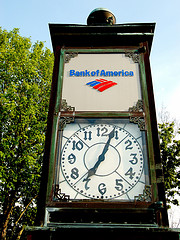Bank Of America Attempts To Discredit Statements Of Former Employees
The statements alleged a variety of bad behaviors, almost all involving the federal HAMP program that was intended to allow distressed homeowners the chance to seek a loan modification to make their loans more affordable.
“The declarants wildly misrepresented their duties at the Bank,” reads a document [PDF] filed by BofA earlier today with a U.S. District Court in Massachusetts, “and most had only minimal involvement with HAMP—or none at all.”
TITLES TITLES
The bank takes particular issue with the job descriptions given by the former employees in their statements. In the court papers, BofA claims that three of those people who provided statements were “call-center operators whose only involvement with HAMP would have been to forward calls to other departments if a borrower might qualify.”
But in their sworn statements, given under penalty of perjury, those employees described their positions as 1: a “Senior Collector of Loss Mitigation/Mortgage;” 2: a “collector,” whose job “consisted of speaking on the telephone with homeowners who were calling regarding a loan modification that they had applied for as part of [HAMP]; 3: a “Home Retention Specialist” at a call center in Fort Worth, Texas.
BofA claims that the contractor, who worked for a company called Urban Settlement Services, was only responsible for “processing customer complaints, not HAMP applications.” Though it does not state that this contractor didn’t deal with HAMP-related complaints.
The bank tries to discredit the statement of one ex-employee by alleging that he never worked as an underwriter as he claimed in his statement. However, it’s worth noting that BofA does not dispute his assertion that he was a Case Management Team Manager. Most of his statement deals with incidents he witnessed during his tenure in that position.
BofA does admit that the former Countrywide loan originator who joined the bank staff when it acquired the failing mortgage giant was indeed working as an underwriter but claims, “he was tasked solely with running income calculations and had no role in making eligibility determinations as he claims.”
GIFT CARDS
Two of the seven statements allege that BofA provided incentives, in the form of gift cards and cash, for employees who met quotas for initiating foreclosures or rejecting modification applications.
In today’s filing, Bank of America mischaracterizes these statements, claiming that the two ex-employees “each contrived allegations that they received gift cards or cash to refer loans to foreclosure or deny HAMP modifications, but they worked in departments that did not have the ability to do either of these things.”
In fact, neither of the statements from these two women claim that they received gift cards or cash, merely that they witnessed this practice.
MOTIVATED SPEAKERS
If Bank of America is correct that these former workers are fabricating their stories, what could the motivation be?
“The declarants have a significant motive to manufacture false allegations against Bank of America, since at least six of the seven were fired for inappropriate behavior—including threatening violence against a coworker… sending inappropriate text messages to a member of his team… and bullying his
associates.”
The only one of the three employees cited by BofA to mention his dismissal in his statement was the last one, who claimed he “was fired despite having excellence performance results.”
WAIT — WHAT ABOUT HER?
Interestingly enough, the bank makes no effort to discredit the statement of a former customer service representative who stated that she was instructed to tell every homeowner who called that their application was “‘under review’…even where the computer system showed that the file had not been accessed in months or when the homeowner had been rejected for a modification.”
This same former employee, whose bona fides are not questioned in Bank of America’s filing, then stated, “My co-workers and I were instructed to tell homeowners that modification documents were not received on time or not received at all when, in fact, all documents were received on time. We were also instructed to tell homeowners that documents were sent on a particular date, when they had not been sent at all.”
The only attempt to negate such claims is this lovely bit of text:
In sum, the declarants could not have witnessed what they claim to have witnessed because they were not in a position to do so—and would not have witnessed such things in any event because Bank of America’s actual practices were diametrically opposite.
Which is like an accused murderer saying he couldn’t have committed the crime because he’s opposed to the idea of murder. We’ve watched enough episodes of Dateline to know that this doesn’t usually carry much weight in court.
There will be a hearing on Aug. 1 to consider whether or not this lawsuit can be certified as a class action.
In related news, a group of homeowner recently filed a similar suit against BofA and Urban, claiming that the statements given in the Massachusetts case are evidence that the bank violated federal anti-racketeering laws.
Want more consumer news? Visit our parent organization, Consumer Reports, for the latest on scams, recalls, and other consumer issues.


